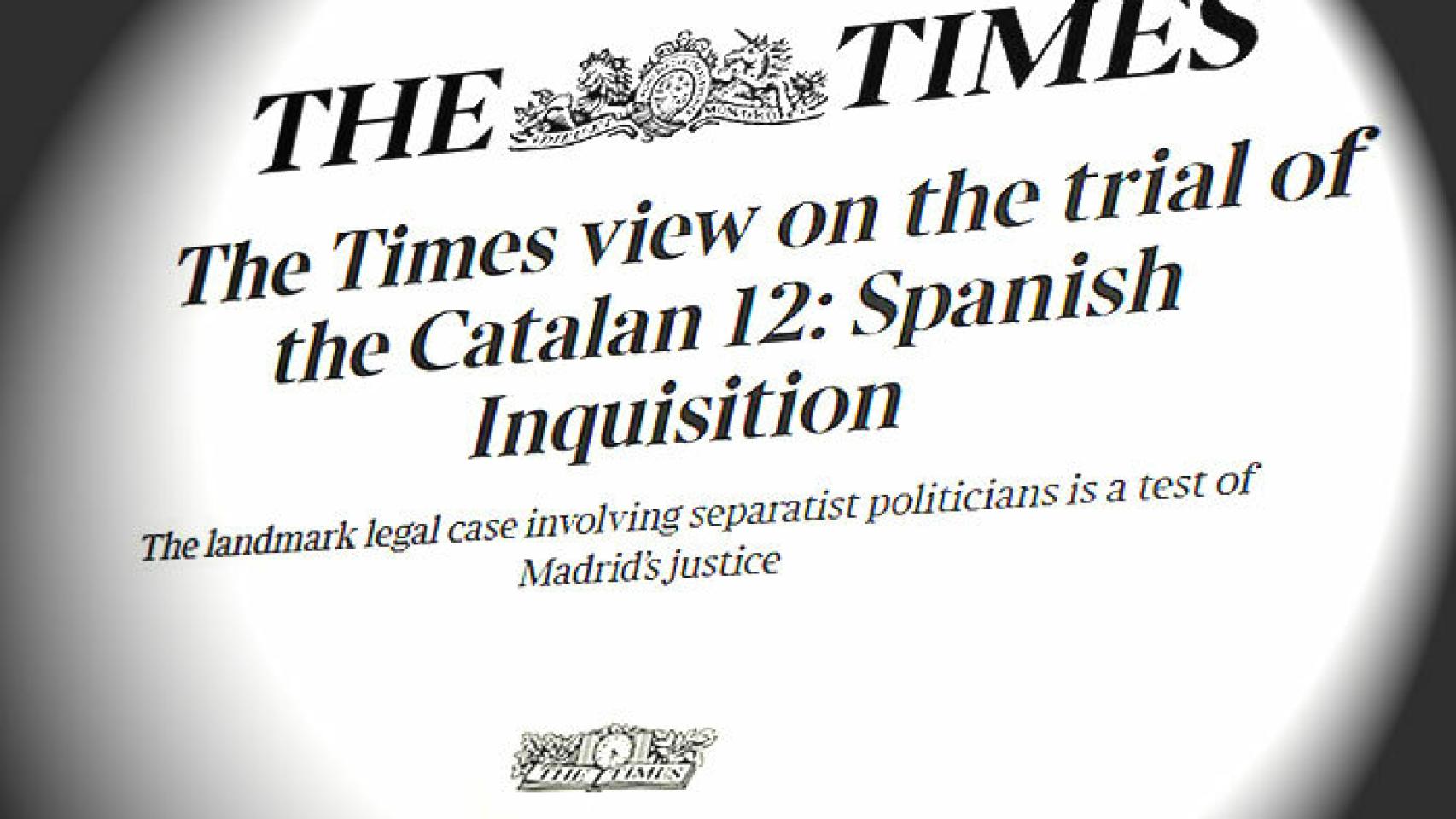The expression 'Spanish Inquisition' is not mine. It is the headline of one of the editorials in The Times about the process of procés, along with another article in which the newspaper states that in Spain we suffer from "anxiety" to demonstrate to an expectant world that our justice is fair and we can guarantee a fair trial. In some other article I have explained that I am a subscriber to El Español but I am also a subscriber to The Times and I read it despite everything. I mean that I have Admiral Mr. Blas de Lezo as a reference but I refuse to follow his advice to good Spaniards about looking at England depending on what moments. You know what I'm talking about and if not... you can find it in Google.
I can't help it, I admire the British as a collective. They have always been able to face together the greatest adversities and come out of them with their heads held high, although it is true that also they have committed together the greatest nonsense (e.g. Brexit, to go no further) and that they have their miseries: the previous Tuesday to dedicate that free pearl to the Spanish justice system, The Times published a very brief article (page 14) that explained that the technology of graphite transistors for recharging devices via wifi is already a reality, but forgot to mention Dr. Tomás Palacios, the Spanish scientist from the Massachusetts Institute of Technology (MIT) who leads the international team to which the scientific feat must be attributed.
Every great people, like every great person, must be given a margin for misery, but even so I was surprised by the crudeness of the headline and the unnecessary disqualification it contains. I find it as crude and out of place as disqualifying British justice at this point because of the ignominy of Anne Boleyn's trial, or because of the many poor women sentenced in England to a horrible death by witchcraft, or because of the condemnation of the Four of Guildford which, by the way, is a much more recent episode than the Inquisition.
It's not proper for The Times. But I was even more surprised by the headline after reading the editorial and the article about the process of the procés. They explain that in Spain there is going to be a trial against people accused of organising an illegal referendum, misusing of public funds, illegally declaring the independence of part of the national territory, subverting the constitutional order and putting the country at risk of disintegration due to the chain effect that could have occurred. And if I do not use the word "presumed" it is not because I do not recognise the defendants' right to the presumption of innocence, which I recognise as a defendant in our judicial system, but because I am recounting what the newspaper says and that adjective is not used there at any time.
The Spanish justice system does not suffer from any "anxiety" regarding 'the process of procés', nor does it have any reason to do so
And if so, what's the point of the headline? Would such a thing not merit a trial in the United Kingdom of Great Britain... and Northern Ireland, where the length and intensity of the times the British government has suspended autonomy make the application of Article 155 of the Constitution in Spain a slight nuisance?
The Spanish justice system does not suffer from any "anxiety" regarding the process of procés, nor does it have any reason to do so. I know the judge who has investigated the case and a good number of those who have examined his decisions through appeals and those who have to hold the trial and, of course, I know the curriculum of all of them. The professional, intellectual and moral stature of Supreme Court justices is not compatible with the anxiety that The Times wants to imagine, just as it is not compatible with the stature of the rest of the judges and the Spanish judicial system, which may receive few, if any, lessons from the most advanced judicial systems.
Spain is among the twenty countries classified as full democracy by another British newspaper, The Economist, among other parameters. This is demonstrated by the constant scrutiny to which our judicial system is subjected by the European Court of Human Rights, which places Spain in one of the lowest levels of condemnation of that Court, perfectly comparable to that of the United Kingdom (during 2017, only one more condemnation of the five that the British State had). Spain is inflexibly respectful of the decisions of the European Court of Human Rights, something that contrasts with some reactions of the United Kingdom to the judgments of that Court, as happened with the attitude it maintained to the adverse sentence for the death in Gibraltar of the members of the IRA McCann, Farrell and Savage.
Even less compatible with this anxiety is a dispassionate examination of the investigation and the decisions taken by the Court for the holding of the trial, which have been carried out with the most extreme transparency and the most timely information. Nor are the preparations being made by the General Council of the Judiciary for the trial to be known throughout the world compatible with this anxiety: the trial will be broadcasted on the institutional website in its entirety and live. It will be seen by everyone, including Amnesty International or a Harvard law professor, making the sending of so-called "observers" a pathetic performance.
The Spanish Inquisition is as buried by the weight of the centuries as Anne Boleyn or the witches of Samlesbury, although there are some people who insist on wanting to ignore it. They will know why.
*** José María Macías, senior lawyer, former magistrate, member of the General Council of the Judiciary.
